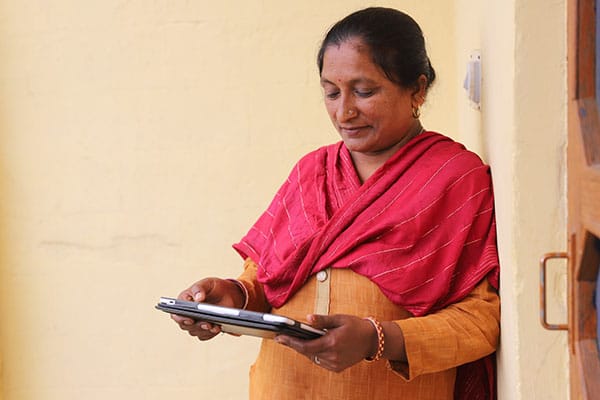Level up: Gaming economic citizenship with Fundacion Capital
Featured Members


Yves Moury is the founder, president, and CEO of Fundación Capital, a nonprofit social enterprise working to improve the financial lives of people living in poverty around the world, partnering with governments and the private sector to design and deliver solutions that increase economic prospects for millions.
Tell us about the mission and vision of Fundación Capital.
Our vision: A world without poverty and exclusion where people become full-fledged economic citizens.
Our mission: Fundación Capital advances financial, economic and digital inclusion of people living in poverty, so they become economically empowered and exercise their full economic citizenship.
At the core of our mission lay in the Economic Citizenship as a Service Strategy (ECaaS). Fundación Capital promotes economic citizenship globally and at scale with technology so people at the base of the pyramid can be included in the formal and digital economy, accumulate and protect their assets (financial, human, productive and natural), develop their capacities and gain access to new opportunities. With this novel data-driven and human-centered approach—Economic Citizenship as a Service—, we connect low-income families with the assets and information that will allow them access to what they need when they need it.
How do you define economic citizenship/financial inclusion and how does it contribute to the Council’s vision of an inclusive economic system?
We define economic citizenship as people’s access, opportunity, capability and right to fully participate in a country’s economic life. That implies not only having access to economic resources, but to a broader well-being, which is not only related to “living the lives people want, achieving valued ways of ‘being and doing’” that includes the right and the duty to live in a healthy environment.
The concept of economic citizenship is inextricably linked with women’s equality, in which economic empowerment is one step towards broader well-being, requiring the transformation of social norms and challenging persistent practices that hamper women’s growth.
What are some of the biggest barriers to financial inclusion, and how do we overcome them?
Everywhere, the economic crisis, the climate emergency, health and social protection schemes, shifts in traditional female paradigms, digital connections and their tools are at the very center of a post-COVID reset. In this world, FundaK must be prepared to contribute with bold and innovative approaches. For this to happen, we must move forward in a more integrated way, with even more rigorous steering. And we must grow steadily to reduce our exposure to conjunctural /cyclical risks (the present pandemic is just one example among many others).
Much of Fundación’s portfolio of work is with adults who have never had lessons in personal finance, but you also have taken on initiatives to discover what school-age children know about managing money and learn how to engage them in this topic. Tell us about the Guardians of Savings (“Guardianes del ahorro”) initiatives in Peru and Mexico, and the goals and motivations behind those projects.

We came up with the Guardians of Savings idea after the success of our LISTA initiative and the need, identified in the field and confirmed by research studies, to develop an equivalent App targeted at children. In Mexico, over 30% of the country’s population is young, and in a nationwide survey conducted years ago by the Mexican government, the need to incentivize a savings culture came up among the priorities identified by the youth. We also wanted to have a multiplier effect, by leveraging the fact that our tablets were already rotating among vulnerable households (recipients of CCT programs). We could see how the kids were naturally attracted to the tablets and we wanted to take advantage of that interest by teaching them basic financial skills, especially savings habits, that we knew would be beneficial throughout their entire life.
Who did you collaborate with to identify and address the need for innovation around children’s financial education? How did you find those collaborators?
We could not have reached our goals without the support and collaboration of our partners. First, SWIFT, who trusted us and agreed to invest in this idea. Second, PROSPERA, who opened us the door by giving us access to their recipient population, and the PROSPERA participants and children themselves, who dedicated some of their precious time to participate in testings and provide feedback so that we could come up with our final product. Last but not least, Sesame Workshop and the Asociación Mexicana de Uniones de Crédito del Sector Social (AMUCSS), who generously agreed to offer their financial education material for field testing purposes, which served as a basis for developing Guardians of Savings. In Peru we worked with the support of the Peruvian NGO Solidarity Vision, which gave us access to public schools; its program (VIVA – Live Values) dealt with issues of citizenship and financial skills.
Were there any surprising lessons learned by the Fundación team as they designed and implemented the learning app?
We observed that the children had a perfect understanding of what saving was, however, they framed it as a mainly monetary aspect (in a piggy bank) and did not relate saving in kind with saving in money. On the other hand, children do not plan and have a hard time identifying what planning is.
Regarding financial services, children know that they exist in general, they have heard of them, but they do not see them as an option for them (like adults), in addition, the presence of financial institutions was not observed in any of the localities. In the community, the difference between formal savings and informal savings is not clear, and they do not know what the benefits of formal savings are.
In general, the relationship with the pedagogical materials we initially tested was very good, however, we observed that the interactive games were more attractive if they introduced some challenge and if they were explicitly related to concepts of financial education since the children do not pay attention to the instructions.
What resources were essential for the completion of this project?
Besides the funding and partnerships, a resource that is not very visible but which is crucial is the effort to align incentives. Multi-stakeholder projects are complex in that incentives of each participant may not necessarily go in the same direction. Public partners may be more interested in outreach, whereas private partners are probably more worried about how to find a link between their CSR activities and their business priorities. Fundación Capital tries to act as a catalyzer that brings this resource to the ecosystem: the effort to align incentives, by understanding the priorities of each stakeholder and seeking how the efforts of everyone can converge into a common goal.
What role do you think the private sector can play in building global financial inclusion?
The Private Sector is crucial to further financial inclusion globally. To the extent that private stakeholders can conceive and fine-tune business models for the bottom of the pyramid, we can count on scalable and sustainable solutions that transcend the short term and that trigger the integration of the most vulnerable into a mosaic of value chains where private players are key. Of course, it is easier to say this than to achieve it. That is why we need to further our efforts to catalyze private sector participation in endeavors that tackle the bottom of the pyramid, and by doing so incentivize innovation and collaboration.
We’ve seen very interesting collaborations between small players in the fintech sector and larger (national, regional, or global) players, for instance, in a recent regional project (Colombia and Mexico) that catered to small agricultural producers’ needs participating in international coffee value chains. In this context, we managed to participate in multi-stakeholder ecosystems where banks, fintech, and international coffee traders aligned their incentives toward piloting digital payments mechanisms.
It is important to stress that private players need to have two fundamental ingredients in their mindset: i. The will to take risks in unexplored territories and demographic clusters and ii. The patience to let the new solutions and their business models achieve their maturation process. This is not always easy, as most private sector players are not necessarily accustomed to the timelines and iteration processes that the bottom of the pyramid requires.
What is your best advice for CEOs who want to engage fruitfully in efforts to reduce poverty and prepare more people to participate in local and global economies?
For companies to engage seriously, sustainably, and at scale in efforts to reduce poverty, I believe those efforts must be linked as much as possible to the company’s core business. There are many different ways companies can be profitable while including the poor in their value chains, whether as consumers, providers, or distributors, and plenty of successful examples have been documented across sectors and countries. But to do so, we must consider poor people as full economic citizens, with the same rights to participate in and benefit from local and global economies as any other citizen, and recognize that poverty is a condition, not a defining trait or characteristic. Finally, I believe that any effort to reduce poverty must be co-created with the target population through a demand-based and bottom-up approach, and must be taken into account from the onset of environmental considerations, as both issues – poverty and climate change – are intrinsically related.
—
Images provided by and used with permission of Fundación Capital.

